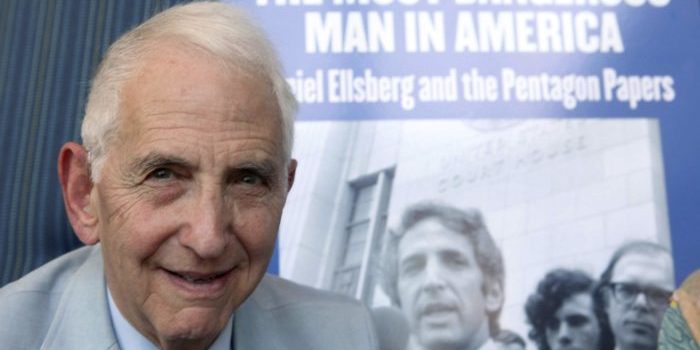(Headline USA) Whistleblower Daniel Ellsberg, who leaked the Pentagon Papers showing U.S. officials’ lies about the Vietnam War, said Thursday that he has terminal cancer and months to live.
Ellsberg posted on his Facebook page that doctors diagnosed the 91-year-old with inoperable pancreatic cancer on Feb. 17 following medical scans. Doctors have given him between three and six months to live, he said.
Ellsberg said he has opted not to undergo chemotherapy and plans to accept hospice care when needed.
The documents in the Pentagon Papers told a secret history of the Vietnam War that was unbeknownst to the public at the time. They told how U.S. financed and pushed France to maintain Vietnam as a colony in the 1940s and 50s, and how U.S. involvement was built up steadily by political leaders and top military brass.
They also revealed that U.S. officials were lying about the accomplishments against the North Vietnamese in the 1960s, while acknowledging the hopelessness of the situation behind closed doors.
Ellsberg, a former consultant to the Defense Department, provided the Pentagon Papers to Neil Sheehan, a reporter who broke the story for the New York Times in June 1971. Sheehan died in 2021.
Sheehan smuggled the documents out of the Massachusetts apartment where Ellsberg had stashed them, and illicitly copied thousands of pages and took them to the Times.
The administration of President Richard Nixon got a court injunction arguing national security was at stake and publication was stopped. The action started a heated debate about the First Amendment that quickly moved up to the Supreme Court.
On June 30, 1971, the court ruled 6-3 in favor of allowing publication, and the Times and the Washington Post resumed publishing stories. The coverage won the Times the Pulitzer Prize for public service.
The Nixon administration tried to discredit Ellsberg after the documents’ release. Some of Nixon’s aides orchestrated a break-in at the Beverly Hills office of Ellsberg’s psychiatrist to find information to discredit him.
Ellsberg was charged with theft, conspiracy and violations of the Espionage Act, but his case ended in a mistrial when evidence surfaced about government-ordered wiretappings and break-ins.
Ellsberg said in his Facebook post that he feels “lucky and grateful” for his life.
“When I copied the Pentagon Papers in 1969, I had every reason to think I would be spending the rest of my life behind bars. It was a fate I would gladly have accepted if it meant hastening the end of the Vietnam War, unlikely as that seemed [and was],” he wrote.
“Yet in the end that action—in ways I could not have foreseen, due to Nixon’s illegal responses—did have an impact on shortening the war,” he wrote.
Adapted from reporting by the Associated Press

